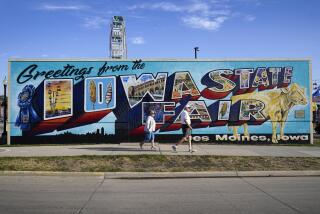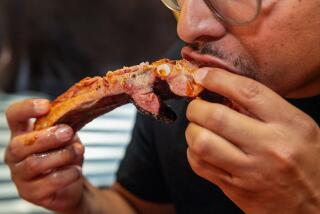Smell of Money Divides Hog Farms, Neighbors
- Share via
DES MOINES — Richard Lanning could put up with the flies and smell from the hog lot across the road, but he couldn’t stop worrying about the possibility of pollution from the farm.
Finally convinced that the hog operation had driven down the value of his home, Lanning asked officials to give him a break on his property tax bill.
“If you ever sell, it’s going to hurt the value, no question about it,” said Lanning, 76, a retired farmer who lives near Rutland in north-central Iowa.
In May, Humboldt County’s board of review reduced the assessed value of his ranch-style house to $46,133 from $71,455. He’ll owe $328 less a year in property taxes.
Such decisions by review boards in Iowa, and for the first time by a board in Illinois, are at the center of the latest fight over large-scale hog-confinement operations, which are growing in rural areas around the country.
Although the family farm with a few pigs in a pen still exists, the increasingly popular way to raise hogs is indoors in giant buildings that hold hundreds, even thousands, of animals. Most of the feeding and other chores are automated, and many operations have several confinement buildings in one location.
The hogs’ waste goes into clay-lined lagoons or into concrete or steel pools that can hold millions of gallons of liquid manure.
Environmental and community activist groups contend these huge operations threaten drinking water and the quality of rural life. They see the review board actions, though local, as pointing the way toward regulations that could be widely adopted.
But to some officials in Iowa, the state that ranks No. 1 in pork production nationally, the reassessments are illegal. None have yet been challenged in court, however.
Pork groups argue that the hog facilities are an efficient extension of their industry, pump millions of dollars into the economy and provide fertilizer for farmland.
As for Lanning, the retired farmer, he says he’s not trying to make a political statement.
“I think the board of review treated me fairly, and I think they have good reasons for doing what they did, and I have no qualms about the guys at the hog house or anybody else,” he says. “I just try to live a good life.”
Roger Larson, who serves on the review board, says its job is “to determine loss in one’s property and then compensate that person for that loss.”
Larson is a member of Citizens for Community Improvement, an activist group opposed to large-scale livestock operations. But he says no politics were involved in the decision to lower the assessed values of Lanning’s house and four others near hog lots.
“We just determine loss and then determine that in the tax assessment,” he says. “We don’t get into the solution of it.”
The board turned down another resident’s request for tax relief because of a nearby hog lot.
The Iowa Farm Bureau Federation, the state’s largest agricultural group, maintains that the review boards’ decisions are illegal. State law mandates that taxpayers who want lower assessments must have evidence of lower sale prices for comparable homes in their area, the Farm Bureau says.
“The assessors are required to assess a property based on its market value,” says John Muller, the bureau’s director of research. “Market value is simply what price would be agreed to by a willing seller and willing buyer.”
Jim O’Neill, president of the Iowa County Assessors Assn., says of the boards’ actions: “They can’t just lower these things by some value they pick out of the air. Any board of review needs to have the proof. If they didn’t, I don’t think it would hold up in court very well.”
Norm Schmitt, president of the Iowa Pork Producers Assn., fears the assessment changes could hurt communities.
“If certain individuals get theirs lowered, the county has still got to generate the same amount of revenues, so that’s passed on to the other property owners,” he says.
Three years ago, the Osceola County board of review adopted a policy of reducing the property tax assessments of homes within two miles of hog operations. County assessor Sharon Wolter disagreed and raised many of the assessments the board had lowered.
The board rescinded its policy in May, urged to do so by Farm Bureau leaders who said it created “unfair and illegal ramifications.”
Wolter is pleased with the decision. “All we’re doing is watching the sales that come through, and as soon as we can document that the assessments should go down, that’s where they’ll go,” she says.
In February, the board of review in Illinois’ DeWitt County ruled that assessments should be reduced for 23 homes within two miles of a hog lot.
Board members “went on what they thought was fair,” says Sandy Moody, the county’s supervisor of assessments, who was asked by the board to visit the homes periodically and gauge odors from the hog lot.
“If I find with this weekly visit that the odor isn’t there, they may rescind their decision,” she says.
The Iowa and Illinois cases could have a far wider impact than simply reducing local property taxes, says Michelle Nowlin, an attorney at the nonprofit Southern Environmental Law Center in Chapel Hill, N.C., a state where problems with large hog operations have prompted legislative action.
“When something takes hold, when one state does something, when one locality does something to try to gain an upper hand on regulating this industry, other states, other counties, follow suit,” she says. “It has precedential value.”
More to Read
Sign up for Essential California
The most important California stories and recommendations in your inbox every morning.
You may occasionally receive promotional content from the Los Angeles Times.













